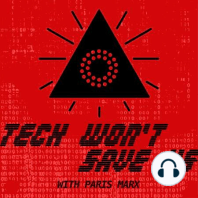45 min listen

History Shows Radical Futures Are Possible w/ Lizzie O'Shea
History Shows Radical Futures Are Possible w/ Lizzie O'Shea
ratings:
Length:
45 minutes
Released:
May 14, 2020
Format:
Podcast episode
Description
Paris Marx is joined by Lizzie O’Shea to discuss how learning about history can empower us to imagine more radical futures, how COVID-19 could create the opportunity to demand a better world, and how the praise for essential workers could help us rethink our ideas about work and the economy.Lizzie O’Shea is the author of “Future Histories: What Ada Lovelace, Tom Paine, and the Paris Commune Can Teach Us about Digital Technology.” She is also the founder and chair of Digital Rights Watch. She recently wrote about how there is no such thing as unskilled labor for The Baffler. Follow Lizzie on Twitter as @Lizzie_OShea.The photo of the Paris Commune mentioned in the episode can be found here.Tech Won't Save Us offers a critical perspective on tech, its worldview, and wider society with the goal of inspiring people to demand better tech and a better world. Follow the podcast (@techwontsaveus) and host Paris Marx (@parismarx) on Twitter.Support the show (https://patreon.com/techwontsaveus)
Released:
May 14, 2020
Format:
Podcast episode
Titles in the series (100)
Elon Musk is a Cult Leader w/ Ilari Kaila by Tech Won't Save Us